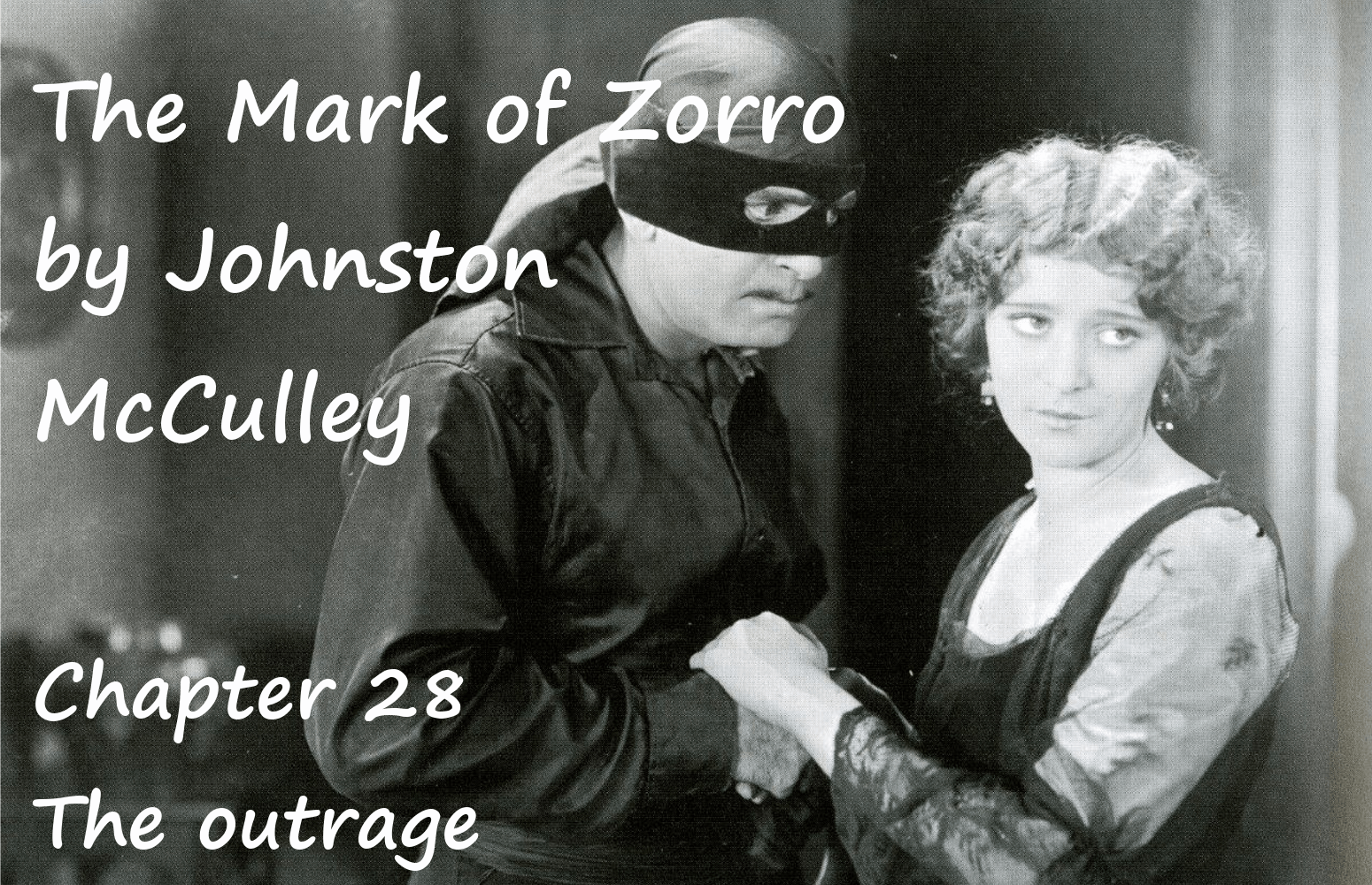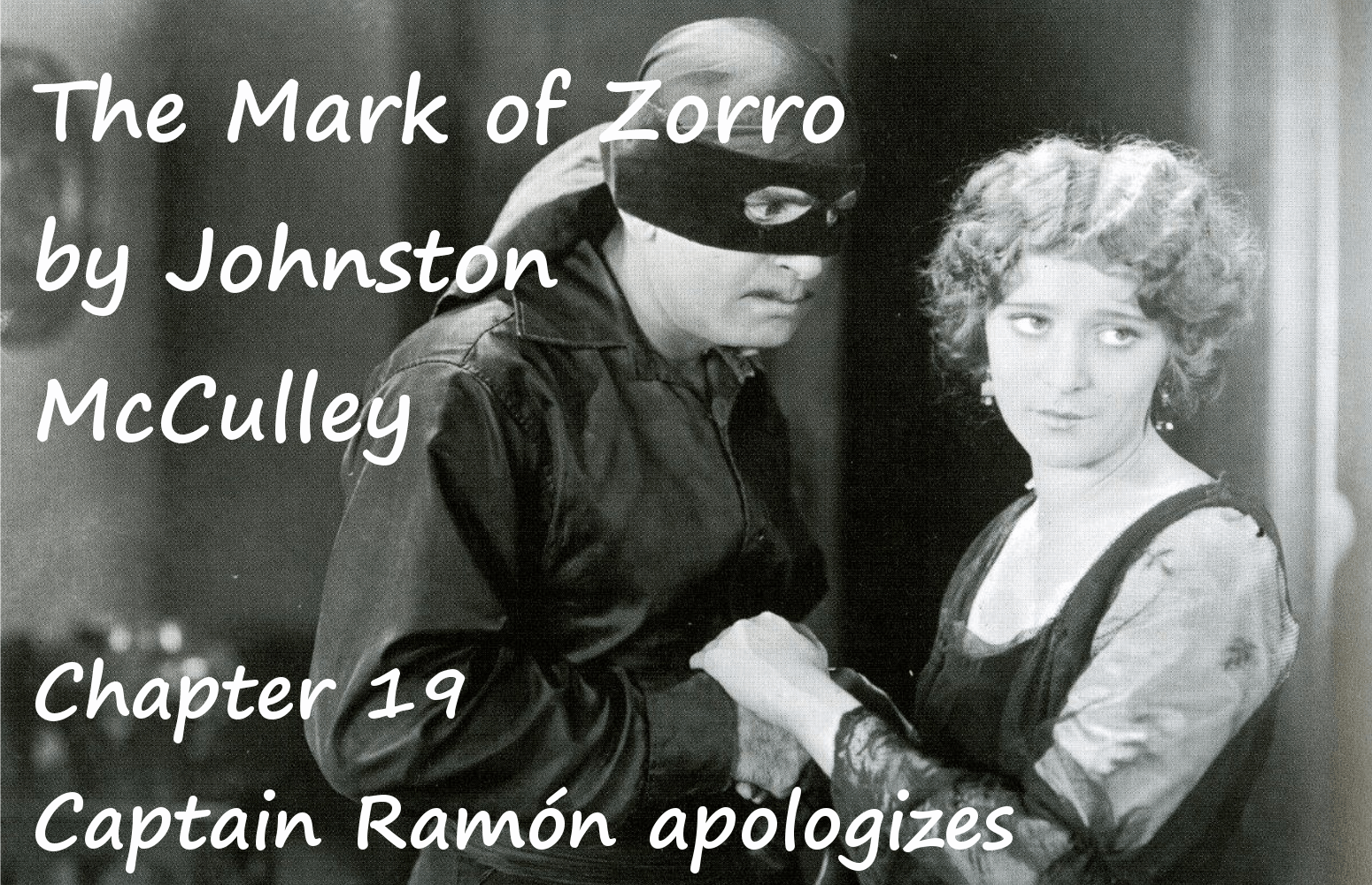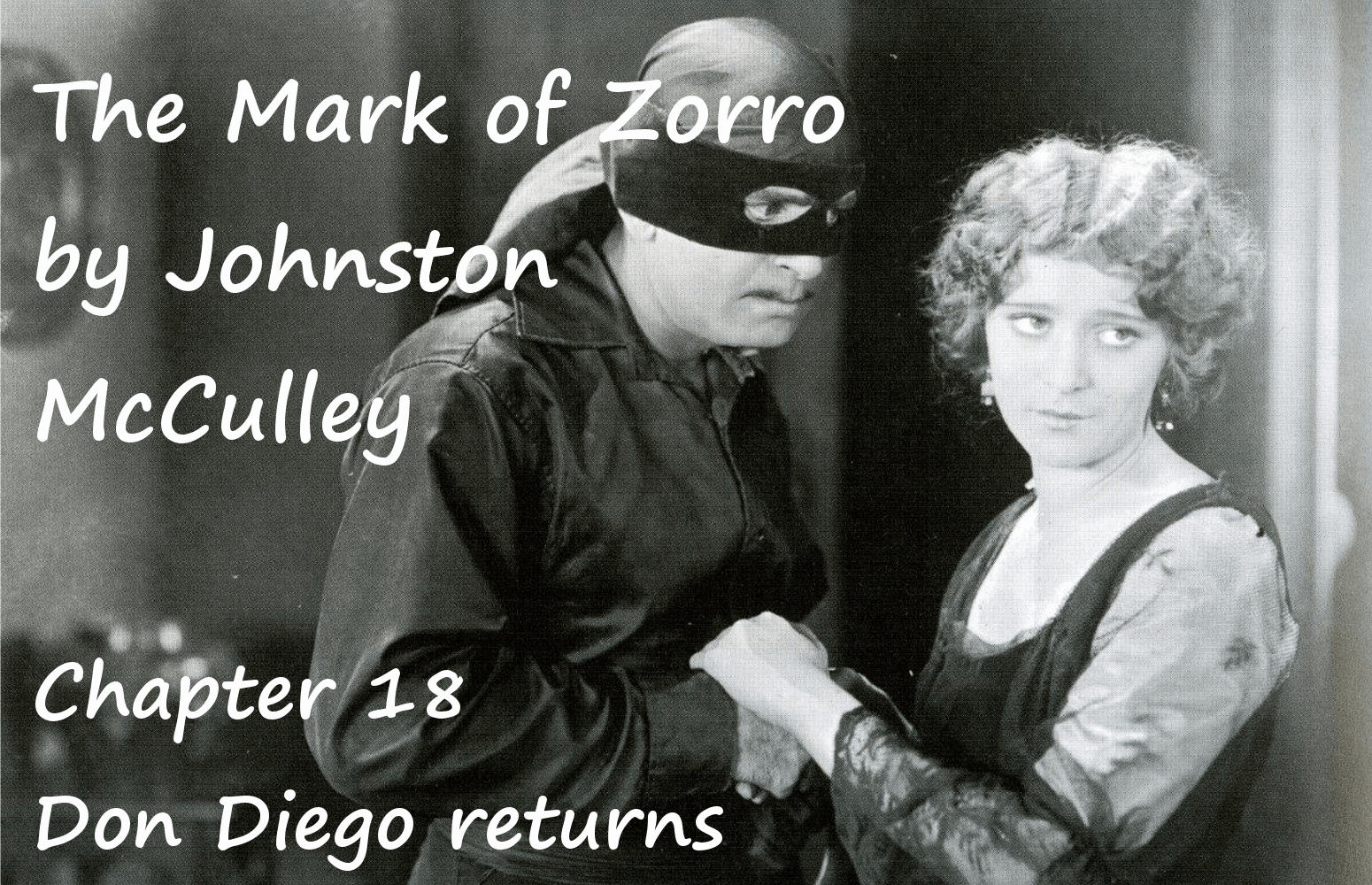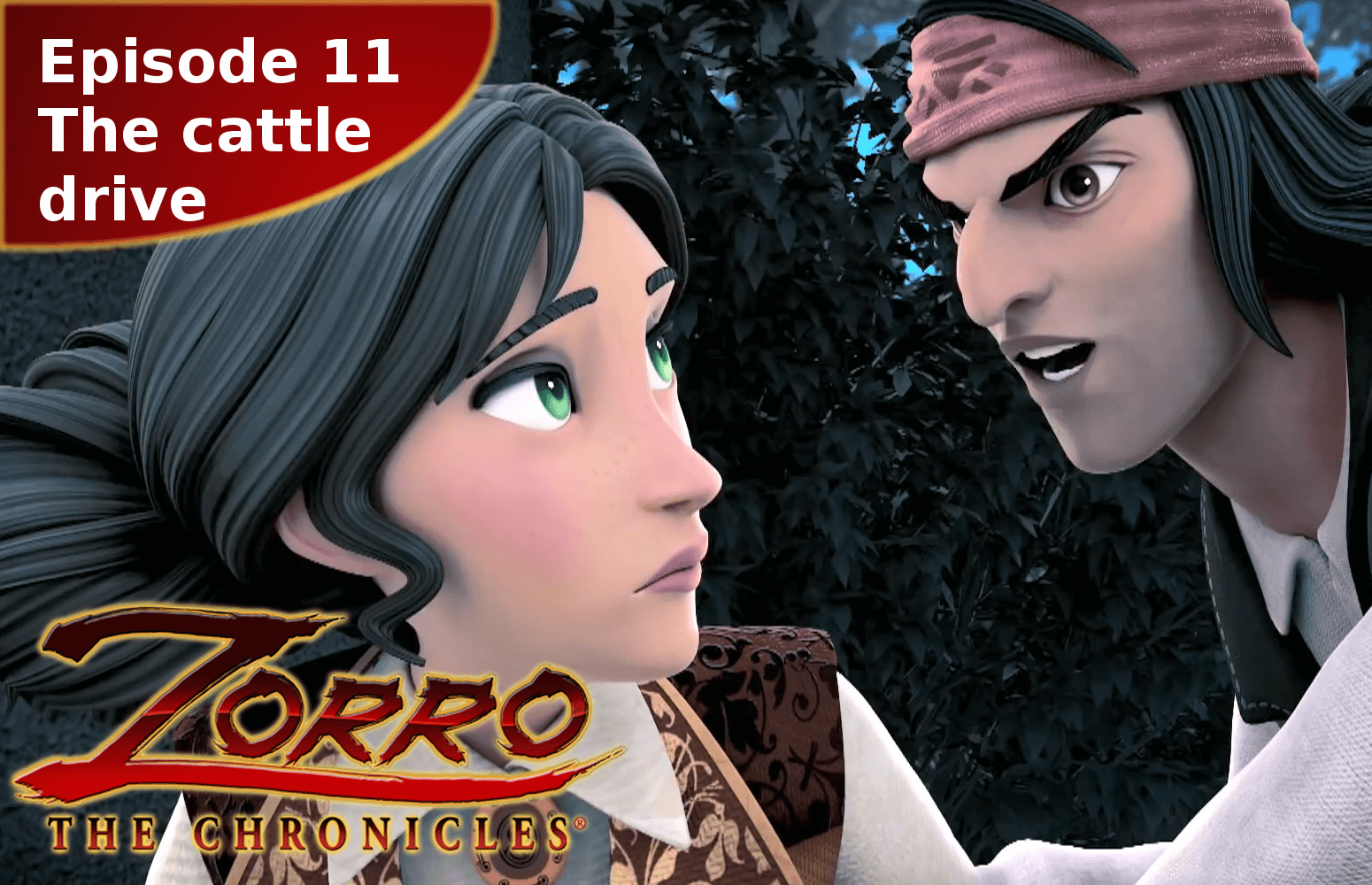The Mark of Zorro chapter 28 The outrage
The Mark of Zorro chapter 28 The outrage
Author McCulley, Johnston, 1883-1958
Title The Mark of Zorro
Note Published serially under the title: The curse of Capistrano.
Language English
Copyright Status Public domain in the USA.
Don Diego’s carriage had just pulled up before his house when a squad of troopers went by it in a cloud of dust. He did not recognize any of them for men he had seen about the tavern.
“Ha! There are new soldiers on the trail of Señor Zorro?” he asked a man standing near.
“They are a part of the escort of the governor, caballero.”
“The governor is here?”
“He arrived but a short time ago, caballero, and has gone to the presidio.”
“I suppose they must have fresh news of this highwayman to send them riding furiously through dust and sun like that. He appears to be an elusive rascal. By the saints! Had I been here when the governor arrived, no doubt he would have put up at my house. Now some other caballero will have the honor of entertaining him. It is much to be regretted.”
And then Don Diego went into the house, and the man who had heard him speak did not know whether to doubt the sincerity of that last remark.
Led by the courier, who knew the way, the squad of troopers galloped swiftly along the highroad, and presently turned up the trail toward Don Carlos’s house. They went at this business as they would have gone about capturing a desperado. As they struck the driveway, they scattered to left and right, tearing up Doña Catalina’s flower-beds and sending chickens squawking out of the way, and so surrounded the house in almost an instant of time.
Don Carlos had been sitting on the veranda in his accustomed place, half in a doze, and he did not notice the advance of the troopers until he heard the beating of their horses’ hoofs. He got to his feet in alarm, wondering whether Señor Zorro was in the vicinity again and the soldiers after him.
Three dismounted in a cloud of dust before the steps, and the sergeant who commanded them made his way forward, slapping the dust from his uniform.
“You are Don Carlos Pulido?” he asked in a loud voice.
“I have that honor, señor.”
“I have order to place you under military arrest.”
“Arrest!” Don Carlos cried. “Who gave you such orders?”
“His excellency, the governor. He now is in Reina de Los Angeles, señor.”
“And the charge?”
“Treason, and aiding the enemies of the state!”
“Preposterous!” Don Carlos cried. “I am accused of treason, when, though the victim of oppression, I have withheld my hand against those in power? What are the particulars of the charges?”
“You will have to ask the magistrado that, señor. I know nothing of the matter except that I am to arrest you.”
“You wish me to accompany you?”
“I demand it, señor.”
“I am a man of blood, a caballero—”
“I have my orders!”
“So I cannot be trusted to appear at my place of trial? But perhaps the hearing is to be held immediately. So much the better, for all the quicker can I clear myself. We go to the presidio?”
“I go to the presidio when this work is done. You go to carcel,” the sergeant said.
“To carcel?” Don Carlos screeched. “You would dare? You would throw a caballero into the filthy jail? You would place him where they keep insubordinate natives and common felons?”
“I have my orders, señor. You will prepare to accompany us at once!”
“I must give my superintendent instructions regarding the management of the hacienda.”
“I’ll go along with you, señor“.
Don Carlos’s face flamed purple. His hands clenched as he regarded the sergeant.
“Am I to be insulted with every word?” he cried. “Do you think I would run away like a criminal?”
“I have my orders, señor!” the sergeant said.
“At least, I may break this news to my wife and daughter without an outsider being at my shoulder?”
“Your wife is Doña Catalina Pulido?”
“Certainly.”
“I am ordered to arrest her also, señor.”
“Scum!” Don Carlos cried. “You would put hands on a lady? You would remove her from her house?”
“It is my orders. She, too, is charged with treason and with aiding the enemies of the state.”
“By the saints! It is too much! I shall fight against you and your men as long as there is breath in my body!”
“And that will not be for long, Don Carlos, if you attempt to give battle. I am but carrying out my orders.”
“My beloved wife placed under arrest like a native wench! And on such a charge! What are you to do with her, sergeant?”
“She goes to carcel!”
“My wife in that foul place? Is there no justice in the land? She is a tender lady of noble blood—”
“Enough of this, señor! My orders are my orders, and I carry them out as instructed. I am a soldier, and I obey.”
Now Doña Catalina came running to the veranda, for she had been listening to the conversation just inside the door. Her face was white, but there was a look of pride in it. She feared Don Carlos might make an attack on the soldier, and she feared he would be wounded or slain if he did, and knew that at least it could only double the charge held against him.
“You have heard?” Don Carlos asked.
“I have heard, my husband. It is but more persecution. I am too proud to argue the point with these common soldiers, who are but doing as they have been commanded. A Pulido can be a Pulido, my husband, even in a foul carcel.”
“But the shame of it!” Don Carlos cried. “What does it all mean? Where will it end? And our daughter will be here alone with the servants. We have no relatives, no friends—”
“Your daughter is Señorita Lolita Pulido?” the sergeant asked. “Then do not grieve, señor, for you will not be separated. I have an order for the arrest of your daughter, also.”
“The charge?”
“The same, señor.”
“And you would take her—”
“To carcel!”
“An innocent, high-born, gentle girl?”
“My orders, señor,” said the sergeant.
“May the saints blast the man who issued them!” Don Carlos cried. “They have taken my wealth and lands. They have heaped shame upon me and mine. But, thank the saints, they cannot break our pride!”
And then Don Carlos’s head went erect, and his eyes flashed, and he took his wife by the arm and turned about to enter the house, with the sergeant at his heels. He broke the news to the Señorita Lolita, who stood as if stricken dumb for an instant, and then burst into a torrent of tears. And then the pride of the Pulidos came to her, and she dried her eyes, and curled her pretty lips with scorn at the big sergeant, and pulled aside her skirts when he stepped near.
Servants brought the carreta before the door, and Don Carlos and his wife and daughter got into it, and the journey of shame to the pueblo began.
Their hearts might be bursting with grief, but not one of the Pulidos showed it. Their heads were held high, they looked straight ahead, they pretended not to hear the low taunts of the soldiers.
They passed others, who were crowded off the road by the troopers, and who looked with wonder at those in the carreta, but they did not speak. Some watched in sorrow, and some grinned at their plight, according to whether those who passed were of the governor’s party or of the honest folk who abhorred injustice.
And so, finally, they came to the edge of Reina de Los Angeles, and there they met fresh insult. For his excellency had determined that the Pulidos should be humbled to the dust; and he had sent some of his troopers to spread news of what was being done, and to give coins to natives and peons if they would jeer the prisoners when they arrived. For the governor wished to teach a lesson that would prevent other noble families from turning against him, and wished it to appear that the Pulidos were hated by all classes alike.
At the edge of the plaza they were met by the mob. There were cruel jeers and jests, some of which no innocent señorita should have heard. Don Carlos’s face was red with wrath, and there were tears in Doña Catalina’s eyes, and Señorita Lolita’s lips were trembling, but they gave no other sign that they heard.
The drive around the plaza to the carcel was made slow purposely. At the door of the inn there was a throng of rascals who had been drinking wine at the expense of the governor, and these added to the din.
One man threw mud, and it splashed on Don Carlos’s breast, but he refused to notice it. He had one arm around his wife, the other around his daughter, as if to give them what protection he could, and he was looking straight ahead.
There were some men of blood who witnessed the scene, yet took no part in the tumult. Some of them were as old as Don Carlos, and this thing brought to their hearts fresh, yet passive, hatred of the governor.
And some were young, with the blood running hot in their veins, and they looked upon the suffering face of Doña Catalina and imagined her their own mother, and upon the lovely face of the señorita and imagined her their sister or betrothed.
And some of these men glanced at one another furtively, and though they did not speak they were wondering the same thing—whether Señor Zorro would hear of this, and whether he would send word around for the members of the new league to gather.
The carreta stopped before the carcel finally, the mob of jeering natives and peons surrounding it. The soldiers made some pretense of holding them back, and the sergeant dismounted and forced Don Carlos and his wife and daughter to step to the ground.
Uncouth and intoxicated men jostled them as they walked up the steps to the door. More mud was thrown, and some of it spattered upon Doña Catalina’s gown. But if the mob expected an outburst on the part of the aged caballero, it was disappointed. Don Carlos held his head high, ignoring those who were striving to torment him, and so led his ladies to the door.
The sergeant beat against it with the heavy hilt of his sword. An aperture was opened, and in it appeared the evil, grinning face of the jailer.
“What have we here?” he demanded.
“Three prisoners charged with treason,” the sergeant replied.
The door was thrown open. There came a last burst of jeers from the mob; and then the prisoners were inside, and the door had been closed and bolted again.
The jailer led the way along an evil-smelling hall and threw open another door.
“In with you!” he directed.
The three prisoners were thrust inside, and this door was closed and barred. They blinked their eyes in the semigloom. Gradually they made out two windows, some benches, some human derelicts sprawled against the walls.
They had not even been given the courtesy of a clean, private room. Don Carlos and his wife and daughter had been thrust in with the scum of the pueblo, with drunkards and thieves and dishonored women and insulting natives.
They sat down on a bench in one corner of the room, as far from the others as possible. And then Doña Catalina and her daughter gave way to tears, and tears streamed down the face of the aged don as he tried to comfort them.
“I would to the saints that Don Diego Vega were only my son-in-law now!” the don breathed.
His daughter pressed his arm.
“Perhaps—my father—a friend will come,” she whispered. “Perhaps the evil man who caused this suffering will be punished!”
For it seemed to the señorita that a vision of Señor Zorro had appeared before her; and she had great faith in the man to whom she had given her love.



